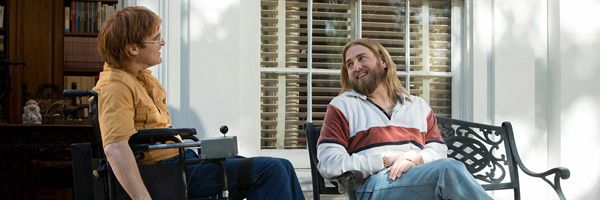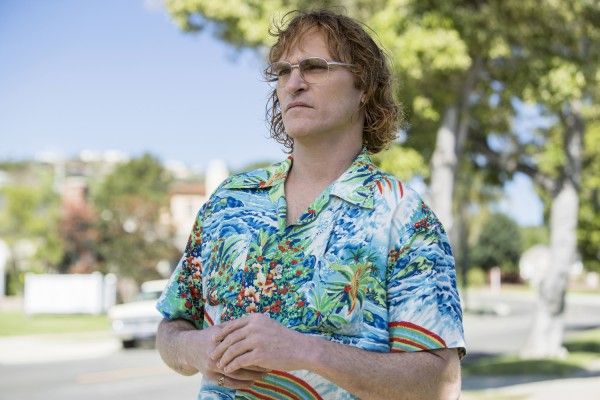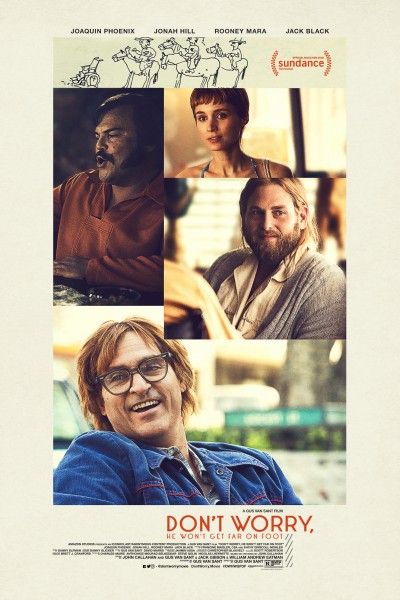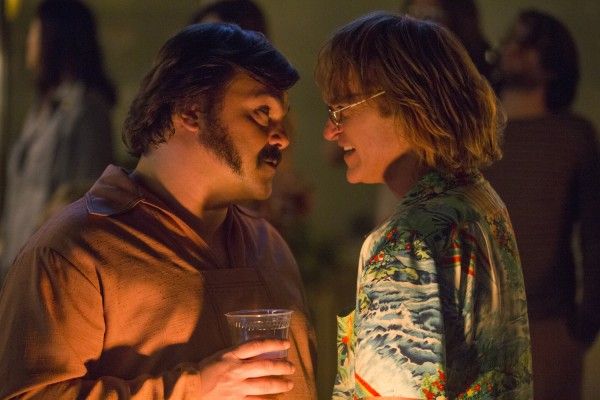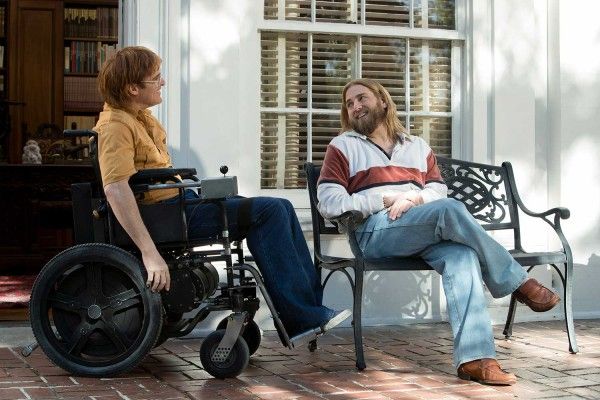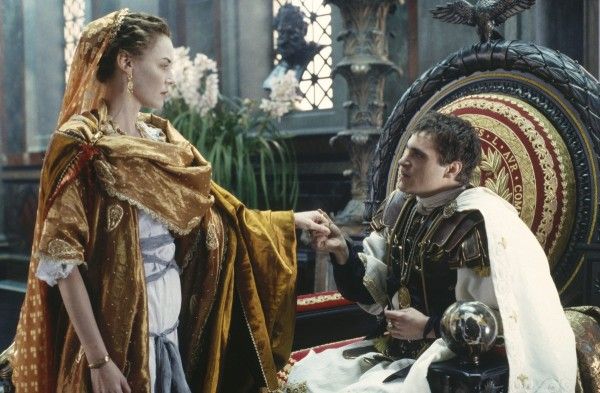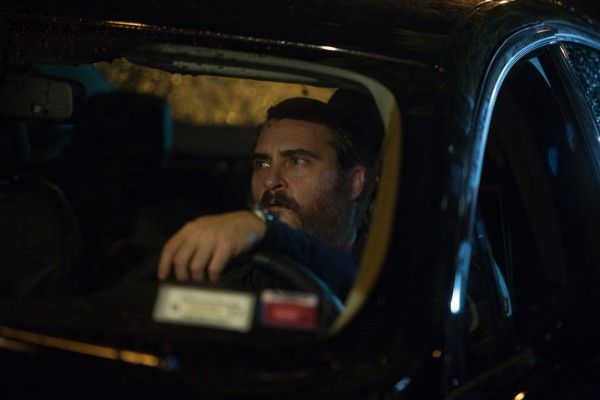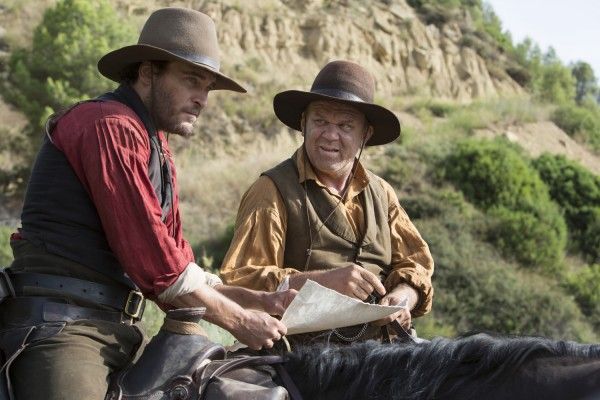Writer/director Gus Van Sant's Don’t Worry, He Won’t Get Far on Foot—now playing in limited release after world-premiering at this year's Sundance Film Festival—is based on the true story of artist/cartoonist John Callahan (Joaquin Phoenix) who became a quadriplegic and nearly lost his life after a night of drinking with his friend (Jack Black). Eventually, he enters treatment for his alcohol addiction in AA and finds comfort from his girlfriend (Rooney Mara) and a charismatic sponsor (Jonah Hill). Along the way, he starts drawing irreverent and shocking cartoons which get published in the New Yorker, Penthouse, and Playboy. As you might expect from a movie that stars Joaquin Phoenix and Jonah Hill, the performances are fantastic and reason enough to seek out this film.
Last week, I landed an exclusive interview with Joaquin Phoenix. During the wide-ranging conversation, he talked about working with Gus Van Sant, how he got involved in the project, the wheelchair stunt, how he got ready for the role, playing a real person, trying to make Don’t Worry in 25 days, working with Jonah Hill, and so much more. In addition, he shared a great story about making Gladiator with Ridley Scott and what it was like making director Jacques Audiard’s The Sisters Brothers with John C. Reilly.
Check out what he had to say below.
Collider: So, I'm going to start with the most important question, the thing that everybody wants to know. How is your vegetable garden (we previously spoke about it here)?
JOAQUIN PHOENIX: It's not good. It's not good. Well, here's what happened. Once you have your first garden they go, "Oh, this is where it's happening." But the first time it went so easy and then this last time there were a couple things which I planted for this season and had to leave suddenly the next day for five days. I asked somebody to water it but they're just not going to care for it as much as you would. And so it really struggled and I’ve been busy for the last six weeks or something—and it was planted in June—so it's been a struggle. My carrots are bangin’, my zucchini is bangin’, but the lettuce never came through, and are we really talking about my fucking garden?
I kind of figured everyone else was starting with the Joker. So I wanted to go with your vegetable garden.
PHOENIX: That's a good move.
That's the way I roll. Jumping into why I get to talk to you today, you've worked with Gus [Van Sant] before, but I think it's been like 20 years. Had you guys been talking about trying to do something together for a while?
PHOENIX: I think we really have maybe, three years ago, I've wanted to work with him but nothing has ever come together. A few years ago we were talking about it and it just didn't work out. But he reached out with this book and that was it.
Was it Gus that got you to do the project? Was it the script? Was it his story?
PHOENIX: It was all of those things. I know we talked about it before, but I'm not a person that will just make a movie cause I like the filmmaker. There has to be something in the character that I think is interesting to me, or challenging. And there is so much about this dude, about John, about his life. I think what I was most interested in was—that I didn't really know much about—was just cartooning. I've never really paid attention to cartooners. We had comics when I was a kid, but when I saw cartoons I never thought much of it. But I started reading his book and realized what an art form it was. And it's always nice when there are things that you can't just pass by and not take notice of and something kind of draws your attention to it. And you realize what a powerful medium it is. And so I was really curious about that and what his process was, and how he came up with that and how he drew. I like people that are creative and driven and are passionate about something.
There's a shot in the movie where you are going super fast wheelchair and you go flying out of it and hit the ground. Just to confirm, was this like a Tom Cruise-esque stunt? That was really you?
PHOENIX: I know that I did do that, but I know that there was also a wide shot that the stuntman did first. And I wanted to do it, but let's be very clear. This is not Tom Cruise-esque; you can not equate jumping out of a fucking plane at 35,000 feet with rolling off of a chair. So I appreciate that. Thank you for putting me in the same class as Tom, but ain't nothing close to it.
But I gotta’ tell you something, it looks like you go pretty hard into the ground. So I'm just curious, do you remember doing that shot? Were you hesitant? Because you're taking a pretty nice blow.
PHOENIX: First of all, they put down like a cushion that looks like asphalt, so you're not really just hitting asphalt. But what was scary about it is, there's a rope attached to the chair that at some point gets taught and that's what stops the chair from moving and you fly out of it. So I didn't know exactly when it was going to happen. The first time as I'm moving towards the curb, I thought, "Okay, it should come right now." And it didn't happen. And I thought, "I'm just gonna ride off of the curb in the chair," which is probably gonna be more painful, like the chair's gonna crash into me. And then right as I had that thought, it stopped. I couldn't help, just reflex, I jumped out and like rolled. And I was like, “Okay, didn't think that was gonna happen.” So then we did the second take, and again, I anticipated it so much that I just reacted and I couldn't just let my body go. The third or fourth take, where I just had to completely give into it, and just go, “I'm just gonna sit here until I lunge,” and, you know, I'll fly out of the chair.
It must have been one of those takes because it looks great. You look almost angry in the shot, but that's also the character you're playing.
PHOENIX: That was perfect, absolutely.
You've worked with a lot of gifted filmmakers. What is it about Gus that you love?
PHOENIX: I've known him for so long, I met him first through my brother, and had so much respect for him. Gus is a director that I really credit for helping to shape the kind of actor that I am. I worked with him at a really critical moment in my career.
I was just starting out again after being a child actor and, typically, child actors, you very much feel this expectation of just achieving what's in the script. And that's what you're encouraged to do. When I started working with Gus, he was the first person that just said, what's most important, essentially, is that you feel something that you're connected to the character in some way...that interpretation..I thought about that...not somebody else's...not just their interpretation of the character. That was revolutionary to me because I thought that the goal was to try to satisfy what was written. I mean, [he was] the first one that kind of let me feel like, just because it says you're supposed to laugh doesn't mean you have to laugh. It seems so obvious now, but I think it's something that doesn't come up a lot when you're young. So he was such an important figure to me and really shaped the kind of acting that I do, or try to do.
He basically gave you the freedom to act.
PHOENIX: Yeah or freedom to be.
Yeah, maybe act is not the right word. Maybe to be honest in the moment.
PHOENIX: Yeah, precisely, and to own and to surprise yourself and not have an expectation of the outcome. To not be concerned about the results but rather to let the experience determine the results. It's still something that I try to do and all the filmmakers that I've worked with say that's something that they are interested in as well. So he was very important to me.
I know you don't like talking about your process, but when you're playing a real person, how does that change the way you get ready for a role? Did you do anything special for this one?
PHOENIX: Well, it's lucky that you have a wealth of information to draw from. I mean, there’s something really great about doing a character just based on your imagination and the director or writers, but with John having his autobiography it gave so much insight into his perspective. The world, if that's what it is when you're playing the role as you're adopting a new kind of perspective. That was really helpful, as well as Gus had all of this homemade footage that he made, footage he shot of John. So I could see very specific movements that I didn't expect. I'd heard that he was a quad, I thought that he had very little movements, but even the other quads that I worked with at Rancho Los Amigos—which is the rehabilitation hospital where John went—they also said that he seemed to move a lot for a quad.
This movie was made, I think, in like 25 days. How the hell did you do that?
PHOENIX: Yeah, it was really, really fast. I don't know, I think it had a lot to do with Gus. It’s funny because the set, if you came on it, wouldn't feel like people that were rushing because we didn’t have time. I think Gus doesn't do many takes. Honestly, by the time I kind of realized that we were making a movie, we were done. It was so quick. I really like working that way actually.
I want to jump into working with Jonah [Hill]. You guys were fantastic together. The chemistry is so great. What do you think would surprise people to learn about the way you guys liked to work together?
PHOENIX: I don't know what people think would surprise them. I instantly liked him. First, I’ve been a fan. I think he is one of those incredibly rare talents that can do anything. He really is a fine actor. So I was excited to have the opportunity to work with him, but then he's just like the fucking coolest guy. I really liked him. We just really talked a lot, about I think a lot of what John and Donnie talked about. Just talked about life, and different philosophies, and struggle, and death, and these things that were on their minds we would talk about in between takes. We just were always having those conversations. So there was this kind of like concerted effort, in the beginning, to try to get to know each other and develop a certain intimacy. Then at some point, it just was second nature, so easy to be around.
Also, I got to experience something that's really rare, which is seeing an actor find the character and then continue to explore and develop it further. It was the second day...there's just like this moment where he unlocked a part of a Donnie and it's just shifting, as if he was Donnie and it wasn't an actor trying to do things. He found them. And I just was like “aw, fuck, that’s so amazing, I can’t believe I saw that.” Then we went to the next scene and he found this one part of him and now there was this different scene that required a different color from Donnie. He went through this process of finding that over the course of a few takes and it just was fucking…I can't really remember seeing that in another actor, like getting to witness it. It's something that's just so exciting to watch. We talked about it afterward, the idea that you never really have the character, that you're constantly searching. Just when you get one scene and you've unlocked one part of them and you feel like, "Oh, I've got it." You're back to it and you start at the beginning. There's a part of them that I haven't discovered yet. It was just so inspiring and exciting to witness.
You guys also had some great group scenes, and again, it just felt believable. Especially the way Gus shot it all. What do you remember about filming those scenes?
PHOENIX: Yeah, we had done a very loose reading of the script a couple of weeks prior but it was incredible. First of all, I’m a huge Kim Gordon fan. And there were so many wonderful actors that we had. I really didn't know Beth Ditto, but the meeting she had, you know, a great personality and all of the actors, I thought, were bringing something very unique to their characters. There were things that I didn't know that they were gonna say, but they talked about. And it really immediately felt like we were just this group. I think the most insane thing is, initially I felt a little intimidated or removed and I felt like that's because I don't know them, that's what I'm supposed to feel. But they had also just met each other and they seemed to have this like, incredible rapport and chemistry. So we fucking ripped through those scenes. There was some stuff we were gushing through in like one take. It was a great day shooting those scenes.
That's crazy — one take. That's fast. That's how you shot it in 25 days.
PHOENIX: Yeah, I mean, there was like a moment or something I said, “Well, Gus, this is kind of the really important thing, maybe we should do it again.” He’s like “Oh no, I like it.” I said, "Oh, okay."
He has a little bit of a track record. I guess you can trust him.
PHOENIX: Yeah. Yeah, totally.
I have a few fun questions, or at least they're different and not about this movie. When you look back on the many roles you've played, do you remember which one you were the most nervous when you first walked on set, or do you have that like nervousness on every movie when you first walk on set?
PHOENIX: I absolutely have that nervousness on every movie...but I know that I've seen other actors that have it, too. Sometimes I'm literally shaking. But I think that probably Gladiator was one of the most intimidating because the first set that I went on was just massive. It looked like it was acres of land, and tons of trucks and trailers and, you know, hundreds of extras, and multiple cameras. Suddenly the scale of this hit me and I was overwhelmed by that. I didn't think that I was going to be able to make it through that. That was probably the one that sticks in my mind.
Was that one of those things where you're like calling Ridley [Scott], and you're like, "Look man, this thing might not work out." Did you ever get to that point?
PHOENIX: Yeah, I mean, we were already there and definitely, I went to him and said, “I don’t know what to do, I just can't do this. I don't know what you're gonna do. This just isn’t gonna be possible.” And Ridley was really smart. He just shot me for four hours and he didn't put film in the camera.
Wait, say that again?
PHOENIX: Tired me out. Right, you don’t know the story. The first scene that I did, I was really nervous, and we shot, I don't know, an unbelievable amount of takes. A shocking amount. Over and over again. And at some point at the end, after hours, he finally said, “Okay, we got it.” And then later on, when we were working on the film, he told me that he hadn’t been putting film in the camera for like the first 30 takes.
He was just calming you down.
PHOENIX: Yeah, he wasn't gonna waste film. He's like, “It's gonna be hours before this kid fucking gets anything, if at all, so I'm not gonna waste film.” This is back when it was film. That costs money. It wasn't high-def. He just wasn’t about to waste his film. But everybody did everything, the camera did its movements, sound people, everyone behaved as if we were shooting takes.
What's interesting, though, if it was really at the beginning of the shoot, it was also everyone just getting ready to make this movie.
PHOENIX: Yes, but they had actually been shooting for a couple weeks, I think, before I got there. So everybody else in there was like down, they were in the flow, and then I came in and fucked everything up.
You know something? I think everything worked out. That movie went on to be pretty popular.
PHOENIX: Yeah.
I actually really dig that movie. So whatever you think of it…
PHOENIX: Yeah, no I know, a lot of people do. I don't know, it's been so long, I don't even think I saw all of it when it came out. But yeah, certainly, I know a lot of people who like it.
If you had to make a sequel or a prequel to one of your previous films, which one would you choose and why?
PHOENIX: Oh, man.
I'll give you a pass if you don't want to answer it, I just thought it was a fun question.
PHOENIX: It is a fun question. I can't think of anything. You know, it’s weird, in some ways it's almost like a relationship or great love that you have that you've moved on from and that you may think about fondly. But you go, “I don't really wanna ever be with them again and I don't wanna have sex with them again.” A situation like that where they all are important to me, I have such fond memories, but I don't know that I would want to revisit them. But maybe.
I have to jump into The Sisters Brothers, because I can't wait to see this thing. Did you agree to do this because you wanted to work with John C. Reilly and because you're a big fan of Will Ferrell and you figured doing the movie with John, maybe he'll put in a good word with Will and then the three of you can do a comedy?
PHOENIX: No, that wasn't the reason. The reason was I loved Patrick [DeWitt]'s book and I loved the script and I wanted to work with John. I liked the idea of us playing brothers because we look so similar, and I wanted to work with Jacques [Audiard]. I have to be honest, I wasn't that— and I’ve told him this—I wasn’t that familiar with his work, but when we spoke on the phone there was something about what we talked about, how he talked about the film, and I have fucking chills to work with him. So, then they tell me, then they’re saying Riz Ahmed, fucking Jake Gyllenhaal, who’s great, are doing this as well. So it became this— big actors working with a master filmmaker.
I haven't seen all of his work but I absolutely loved A Prophet.
PHOENIX: Yeah, you know he is a very, very special director. One of the most insightful, perceptive directors that I've ever worked with. I mean, fuck. He sees things that you're doing before you do. And it's almost intimidating. Sometimes you feel like he's read your mind. He detects what the most nuanced behavioral things that just aren't true to the moment. I think that most directors, or many directors, might not see or might let you get away with, or maybe feel kind of like they can edit it out or whatever. But he just has this lazer focus. One of the most dedicated, hard-working guys that I’ve ever worked with on some pretty tough locations and schedule and he's the fucking first one there, last one to leave, and just going hard, like a fucking General.
For people who don't know much about it, is there anything that you can tease about the movie or who you play? It's still a while out.
PHOENIX: Right. I mean, I just say that me and John C. Reilly play brothers, and what more can you ask for?
Listen, I'm all in. I mean, all in on this one.
PHOENIX: It's hilarious that me and John are playing brothers. That idea was so exciting to me. You're right, I’ve been a fan of his for a long time. And I haven't seen the movie but from working with him there's really a special, beautiful performance that he gives.
Don't Worry, He Won't Get Far on Foot is now playing in limited release.

